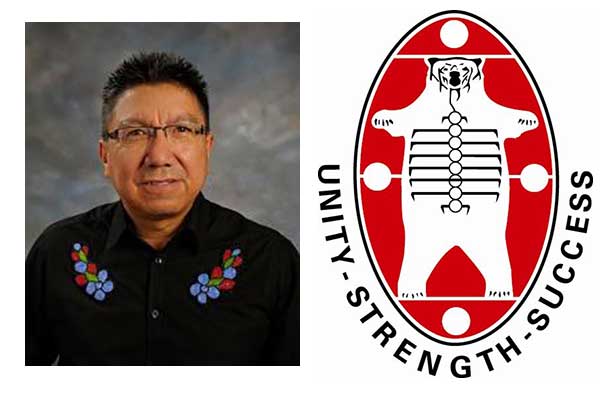TORONTO – Nishnawbe Aski Nation (NAN) Grand Chief Alvin Fiddler brought the tragic story of Charlie “Chanie” Wenjack to newly called lawyers during his keynote address at the Toronto Call to the Bar ceremony at Roy Thomson Hall this afternoon.
“A month from now, October 23 will mark the 50th anniversary of passing of Charlie “Chanie” Wenjack, whose body was found lying beside railroad tracks east of Kenora. Charlie was 12 years old, and like many other children at that time had been forcibly removed from his family in Ogoki Post and sent to Celica Jeffery Indian Residential School near Kenora. He was there for four years. We have learned from his family and former students that Charlie suffered horrific experiences, and that was why he was trying to make his way home. A journey that ended in his tragic death. Why, you might ask, am I sharing this story with you? The answer is because you, and all of Canada, need to know Charlie,” said Grand Chief Alvin Fiddler in his address.
Grand Chief Fiddler addressed nearly 300 newly called lawyers, including the charter class from Lakehead University’s Bora Laskin Faculty of Law. He was conferred with an honorary Doctor of Laws degree (LLD) for championing truth and social justice for First Nation communities and leading the way for First Nation rights and reforms on issues including as police services, clean water, housing and health services.
The Grand Chief focused his address on his special guest at today’s ceremony, The Tragically Hip frontman Gord Downie, and his efforts to reveal the tragic story of First Nation youth during the Indian Residential School era.
Launched earlier this month, “Secret Path” is a multimedia project including an album, graphic novel and animated film depicting the short life of 12-year-old Charlie “Chanie” Wenjack, who died in 1966 while trying to return home to Ogoki Post after fleeing Cecilia Jeffrey Indian Residential School in northwestern Ontario.
Next month marks the 50th anniversary of the death of Charlie Wenjack, who died on October 22, 1966 near Kenora, Ontario. Travelling on foot in an attempt to make the 1,000- kilomtre journey home, his body was found on October 23 along a rail line approximately 60 kilometres from the school.
His tragic story received national attention with the publication of the article “The Lonely Death of Charlie Wenjack” in Maclean’s magazine in February 1967. One of thousands of Aboriginal children who died due to Canada’s Residential School system, his story has inspired many artistic and creative tributes, and was the subject of a moving Heritage Minute by Historica Canada released this summer.
Grand Chief Fiddler expressed his appreciation for Gord Downie’s determination to tell the story of Charlie Wenjack and all youth from the Residential School era youth who never made it home. He is hopeful that what started as a personal journey for Gord Downie to bring the tragic story of Charlie Wenjack to a national audience will become a call to action that will resonate with all Canadians.
Fiddler accompanied Gord Downie during his visit to Marten Falls earlier this month, where the singer visited the grave of Charlie Wenjack and met with surviving family members. He is confident that the Secret Path project will spark national interest in our shared history and help move all Canadians towards the path to reconciliation.
Downie has announced that he will perform his Secret Path project with two solo performances: October 18 in Ottawa and October 21 in Toronto.
Proceeds from the Secret Path album, book and film will be donated to the National Centre for Truth and Reconciliation at the University of Manitoba. The National Centre for Truth and Reconciliation is dedicated to honoring the experiences of survivors that endured the schools, of exposing the impact and legacy of the residential school system and helping move the country further down the path of reconciliation.
For more information:
- Call to Bar Ceremony (www.lsuc.on.ca)
- Secret Path project (www.secretpath.ca)
- Charlie Wenjack Heritage Minute (www.historicacanada.ca)
Here is the speech delivered today by Nishnawbe-Aski Nation Grand Chief Alvin Fiddler:
Good afternoon.
I would like to begin by acknowledging that we are in the traditional territories of the Wendat, Anishinabek Nation, the Haudenosaunee Confederacy, the Mississaugas of the New Credit First Nations, and the Métis Nation.
I would like to acknowledge the candidates we are here to celebrate today and their friends and families.
I also recognise my fellow honouree, Prof. David Weisstub, and I look forward to learning more about his important work in human rights, law and mental health.
Meegwetch Treasurer Paul Schabas and the Law Society of Upper Canada for this great honour.
I am here with my wife Tesa, and some of our close friends: Florence, Kim and Kirsten.
I am also here with three guys who have become like brothers to me over the past few weeks.
Ladies and gentlemen, please welcome to this ceremony Mike, Patrick and Gord Downie.
A month from now, October 23 will mark the 50th anniversary of passing of Charlie “Chanie” Wenjack, whose body was found lying beside railroad tracks east of Kenora.
Charlie was 12 years old, and like many other children at that time had been forcibly removed from his family in Ogoki Post and sent to Celica Jeffery Indian Residential School near Kenora.
He was there for four years.
We have learned from his family and former students that Charlie suffered horrific experiences, and that was why he was trying to make his way home. A journey that ended in his tragic death.
Why, you might ask, am I sharing this story with you?
The answer is because you, and all of Canada, need to know Charlie.
All of us need to know the true history of this country, including the dark chapters of the Indian Residential School experience, in order for us to achieve true reconciliation.
As lawyers, some of you may go on to become Crown attorneys and judges, but all of you have an amazing opportunity to be part of this historic journey.
Your formal training has equipped you with the knowledge and skills you will need to succeed. But there is more.
I encourage you to honour the Seven Sacred Teachings of Love, Respect, Bravery, Honestly, Truth, Wisdom, and Humility and incorporate them in your lives and work.
At the closing ceremony of the Truth and Reconciliation Commission in Ottawa last year, the Hon. Senator Murray Sinclair said:
“Achieving reconciliation is like climbing a mountain. We must proceed a step at a time. It will not always be easy. There will be storms, there will be obstacles. But we cannot allow ourselves to be daunted by the task because our goal is Just, and it is also necessary.”
I am grateful for Gord Downie’s determination to tell the story of Charlie Wenjack and all the children who never made it home.
It is my hope that what started as a personal journey for my friend will become a call to action for all Canadians.
We all know that achieving reconciliation will not be easy.
But Gord is giving us the tools and pointing the way forward. Now it is up to all of us to take this journey together.
We have a challenge ahead of us, but if we walk together and work together, our task is less daunting.
To the newly-called lawyers I wish you well, and I pray the Creator will guide and be with you always as you begin this exciting new chapter of your lives.
Meegwetch.





